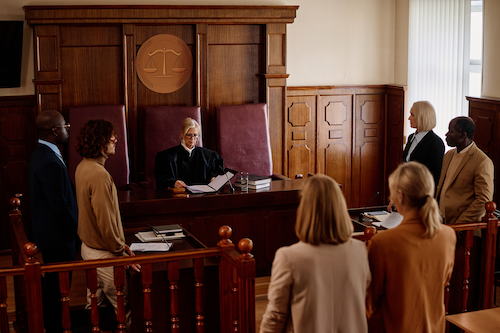
In Henry Keim v. Above All Termite & Pest Control (A-30-22/087603) (Decided November 21, 2023), the Supreme Court of New Jersey held that an employee’s car accident occurred “in the course of employment” and was therefore compensable under the Workers’ Compensation Act (the Act).
In reaching its decision, the Court clarified that an employee is “in the course of employment” under the “authorized vehicle rule” prescribed by the Act when (1) the employer authorizes a vehicle for operation by the employee, and (2) the employee’s operation of that identified vehicle is for business expressly authorized by the employer.
Facts of Keim v. Above All Termite & Pest Control
Above All Termite & Pest Control (Above All) employed Henry Keim as a salaried pest-control technician and provided him with an employer authorized vehicle for work use. In compliance with company policy, Keim drove that vehicle in the morning from his own residence to various worksites and returned home in the same vehicle at the end of the workday.
Above All’s policy limited the quantity of supplies technicians could keep in their authorized vehicles overnight. When technicians needed to replenish supplies, Above All authorized them to drive their vehicles to Above All’s shop instead of driving directly to a worksite, to retrieve whatever they required, and then to go from the shop to the scheduled sites.
On the morning of the accident, Keim clocked in, received his schedule, and concluded that his vehicle lacked sufficient supplies. On his way to the shop for supplies, Keim sustained injuries in a car accident.
The Judge of Compensation dismissed Keim’s claim petition with prejudice, concluding that Keim was merely commuting to work when he sustained injuries.
The Appellate Division, however, disagreed with the Judge of Compensation’s conclusion that Keim was simply commuting to work. Applying N.J.S.A. 34:15-36, the court determined that Keim sustained injuries while in the course of his employment because he operated an “employer authorized vehicle” and was on business “expressly authorized and directed by his employer.”
NJ Supreme Court’s Decision in Keim v. Above All Termite & Pest Control
The New Jersey Supreme Court affirmed. It held that Keim was “in the course of employment” under the “authorized vehicle rule” at the time of the accident because Above All authorized a vehicle for him to operate and his operation of that identified vehicle was for business expressly authorized by Above All.
In reaching its decision, the Court analyzed the New Jersey Workers’ Compensation Act and the four distinct rules that govern when an employee is considered to be “in the course of employment” under the Act: the “premises rule”; the “special mission rule”; the “paid travel time rule; and the “authorized vehicle rule.”
Because Keim argued that his injuries are compensable under the “authorized vehicle rule,” the Court focused on that rule, which provides that “the employment of . . . any employee who utilizes an employer authorized vehicle shall commence and terminate with the . . . authorized operation of a vehicle on business authorized by the employer.”
The Court went on to hold that based on the plain language of the “authorized vehicle rule” in N.J.S.A. 34:15-36, an employee is “in the course of employment” when (1) the employer authorizes a vehicle for operation by the employee, and (2) the employee’s operation of that identified vehicle is for business expressly authorized by the employer.
“Here, consistent with the ‘authorized vehicle rule,’ the employer, Above All Termite & Pest Control (Above All), provided a vehicle and authorized the employee, Keim, to operate that vehicle to replenish supplies at a particular location as needed. Keim was thus ‘in the course of employment’ when he drove his authorized vehicle to obtain the supplies and was injured in a serious car accident,” the Court explained. “As a result, he is entitled to benefits under the Act.”

In State v. Olenowski (A-56-18) (082253) (Decided November 15, 2023), the Supreme Court of New Jersey held that Drug Recognition Expert (DRE) testimony is reliable and admissible under the criteria set forth in Daubert v. Merrell Dow Pharmaceuticals, Inc., 509 U.S. 579 (1993), albeit with certain limitations. The decision is significant given the key role DRE’s play in determining whether drivers are impaired by cannabis or other drugs.
Facts of State v. Olenowski
New Jersey law, N.J.S.A. 39:4-50, prohibits impaired driving, whether the impairment is caused by alcohol or one or more drugs. A driver whose blood alcohol concentration (BAC) level exceeds the 0.08% limit prescribed by that statute is guilty — per se — of driving while intoxicated. However, there is no equivalent per se violation in New Jersey for individuals who drive with impairment-causing drugs in their system.
To enable such detection, law enforcement officials and researchers developed a twelve-step protocol. The protocol consists of twelve steps administered by specially trained officers known as Drug Recognition Experts (DREs). The twelve steps entail interviewing and observing the driver, checking vital signs, administering standardized field sobriety tests, and other information-gathering measures. At the end of the protocol, the DRE, guided by a standardized matrix, reaches an opinion about whether the driver is under the influence of drugs from one or more of seven categories and is thereby unable to operate a motor vehicle safely.
Defendant Michael Olenowski was convicted of drug-impaired driving based in part on DRE evidence. His convictions were upheld on appeal, and the Court granted certification to determine whether DRE testimony is admissible under the “general acceptance” admissibility standard established in Frye v. United States, 293 F. 1013 (D.C. Cir. 1923).
In considering the case earlier this year, the New Jersey Supreme Court adopted a new non-exclusive, multi-factor test for the reliability of expert testimony patterned after the standard established in Daubert. A Special Master subsequently concluded that the twelve-step DRE protocol satisfies the reliability standard of N.J.R.E. 702 when analyzed under the new standard.
NJ Supreme Court Decision in State v. Olenowski
A divided New Jersey Supreme Court determined that the extensive record substantiated that DRE testimony sufficiently satisfies the Daubert criteria to be admissible, with certain safeguards in place.
“First, we unanimously hold that Daubert-based expert reliability determinations in our criminal appeals should be reviewed de novo, while other expert admissibility issues are to be reviewed under an abuse of discretion standard,” Judge Jack Sabatino, who is temporarily assigned to the New Jersey Supreme Court, wrote. “Second, we conclude the extensive record substantiates that DRE testimony sufficiently satisfies the Daubert criteria to be admissible with important limitations.”
In support of the admissibility of DRE testimony, the New Jersey Supreme Court emphasized that the twelve-step DRE process is elaborate and standardized. It further cited that it is grounded in a program that has been used across the nation and abroad for decades and is periodically modified.
Nonetheless, the Court acknowledged that the protocol also has several weaknesses, noting that it does not establish that a driver is actually impaired, or that the drug categories identified by the DRE are definitively the cause of any such impairment. Accordingly, it adopted the following limitations on the admissibility and probative use of a DRE’s opinion in criminal and quasi-criminal cases:
- The DRE may opine only that the evaluation is “consistent with” the driver’s ingestion or usage of drugs, not that it was actually caused by drugs.
- If the State fails to make a reasonable attempt to obtain a toxicology report without a persuasive justification, the DRE testimony must be excluded.
- The defense must be afforded a fair opportunity to impeach the DRE.
- Model instructions to guide juries about DRE evidence should be considered.
In its decision, the New Jersey Supreme Court also advised that unlike a BAC reading of .08% or more in a drunk driving case, the DRE’s opinion may not be used as a per se test of guilt. Rather, the DRE testimony is just one part of the evidence as a whole, and it can be amplified or rebutted.
Justice Fabiana Pierre-Louis authored a dissent, which was joined by Chief Justice Stuart Rabner. Justice Pierre-Louis argued that the majority approved the admissibility of DRE testimony despite acknowledging that they could not determine its reliability. “The majority opinion discounts legitimate concerns about the reliability and accuracy of the DRE protocol and upholds the admission of DRE evidence despite acknowledging that ‘the factors of testability and false positive error rate are largely inconclusive’ and that ‘DRE testimony does not, in and of itself, establish impairment,’” she wrote.

Technological innovations continue to raise novel questions before the state’s highest court. The New Jersey Supreme recently granted certification in Goyco vs. Progressive Insurance Co., which asks whether a person riding an electric scooter qualifies as a “pedestrian” for the purposes of a personal injury lawsuit.
Facts of the Case
The dispute arise froman accident in which an automobile struck plaintiff David Goyco while he was operating a low-speed electric scooter (LSES). According to court documents, on November 22, 2021, plaintiff was operating a Segway Ninebot KickScooter Max when he was struck by an automobile on West Grand Street in Elizabeth. As a result of the accident, Goyco sustained injuries and incurred medical expenses for his treatments.
At the time of the accident, plaintiff was insured under an automobile insurance policy issued by defendant, Progressive Insurance Company (Progressive). The policy provided No-Fault Benefits Coverage (NFBC) pursuant to N.J.S.A. 39:6A-4. On November 22, 2021, plaintiff filed a claim with Progressive for PIP benefits.
Progressive denied plaintiff’s claim, citing that New Jersey No-Fault benefits are only available if the accident involves a qualifying automobile, and the Segway Ninebot Scooter he was occupying at the time of the accident does not meet the definition of a qualifying automobile pursuant to [N.J.S.A.] 39:6A- 2(a) of the New Jersey Auto Insurance Law. The insurer further maintained that pursuant to N.J.S.A. 39:6A-2(h) of the New Jersey Auto Insurance Law, the Segway Ninebot Scooter Goyco was occupying at the time of the accident disqualifies him from meeting the definition of a pedestrian, as “pedestrian” is defined as “any person who is not occupying, entering into, or alighting from a vehicle propelled by other than muscular power and designed primarily for use on highways, rails and tracks.” Goyco subsequently filed suit, challenging the denial.
Appellate Division’s Decision
The trial court dismissed the complaint, and the Appellate Division affirmed. It held that New Jersey’s definition of pedestrian expressly excludes LSES like Goyco was riding at the time of the accident. “Here, it is clear that an LSES is a vehicle propelled by other than muscular power,” the court wrote. “Our determination is grounded in the text of N.J.S.A. 39:1-1, which defines an LSES—in part—as having ‘an electric motor that is capable of propelling the device with or without human propulsion.’”
The Appellate Division further concluded that even if it were to find N.J.S.A. 39:4-14.16(g) allowed it to equate an LSES operator with a bicycle, the statute’s exception defeated Goyco’s argument. The exception provides: “[A]ll statutes …rules and regulations applicable to bicycles. . .shall apply to [an LSES] except those provisions which by their very nature may have no application to…[an LSES].”
Issues Before the NJ Supreme Court
The New Jersey Supreme Court granted certification on October 6, 2023. The justices have agreed to consider the following question: “Is plaintiff, who was operating a low-speed electric scooter at the time of the accident, a ‘pedestrian’ under N.J.S.A. 39:6A-2(h), and therefore entitled to Personal Injury Protection benefits?”
Oral arguments have not yet been scheduled. Please check back for updates.

The Supreme Court of New Jersey recently granted certification in a case that will determine whether the ministerial exception, which prohibits the application of anti-discrimination laws to religious institutions’ employment relationships with its “ministers,” applies to claims other than employment discrimination.
As the U.S. Supreme Court explained in Our Lady of Guadalupe School v. Morrissey-Berru, 591 U.S. ____ (2020), the First Amendment’s religious clauses do not provide religious institutions “general immunity from secular laws,” but they do “protect their autonomy with respect to internal management decisions that are essential to the institution’s mission.” In an issue of first impression, the New Jersey Supreme Court will decide how far such protections extend.
Facts of the Case
In 1988, plaintiff Shlomo Hyman was hired by Rosenbaum Yeshiva of New Jersey (RYNJ), an Orthodox Jewish school, as a Judaic studies teacher. A predominant feature of Orthodox Judaism is a commitment to specific principles of behavior and conduct, such as restrictions on physical contact between unrelated people of different genders. If RYNJ determined, based on its understanding of Orthodox Jewish law and in consultation with halachic authorities, that a Judaic studies teacher has behaved in a way that does not adhere to halacha, it would terminate that teacher’s employment.
Through his position as an ordained rabbi teaching at an Orthodox Jewish School, Hyman applied for and received an annual parsonage allowance from RYNJ. Since RYNJ does not grant tenure status to staff members, Hyman was required to sign a new employment agreement each year he received a new offer letter. By signing the employment agreement, he agreed to abide by certain policies and standards of conduct for teachers that embodied the Orthodox Jewish religious standards and rules of halacha. Hyman also acknowledged receipt and understanding of the Staff Handbook, which set out standards of conduct for RYNJ teachers. The Staff Handbook states that RYNJ teachers, particularly those who teach Orthodox Jewish religious law and practices, are expected to conform to the school’s religious principles, such as refraining from touching students of the opposite gender that are in the third grade or older.
In 2019, RYNJ received allegations of inappropriate interactions between Hyman and female students. He was subsequently placed on administrative leave while the allegations were investigated. After an outside law firm investigation substantiated the allegations, RYNJ terminated plaintiff’s employment. The school also sent a letter to parents informing them of Hyman’s termination.
The letter was spread throughout the entire school community and similar Jewish communities. Hyman later filed suit alleging (1) breach of contract; (2) breach of the covenant of good faith and fair dealing; (3) age discrimination under New Jersey Law Against Discrimination; (4) defamation; (5) defamation per se; (6) defamation by innuendo; (7) injurious falsehood; (8) tortious interference with future economic opportunities; (9) negligent infliction of emotional distress; and (10) outrageous conduct causing emotional distress. Hyman’s complaint alleged RYNJ conducted a “sham investigation” into “baseless allegations.” He then alleged based on the sham investigation, RYNJ wrongfully terminated him, maliciously emailed the letter to the community, and falsely branded him as a pedophile, which prevented him from obtaining employment as a rabbi or Jewish education teacher.
RYNJ moved for summary judgment pursuant to the ministerial and ecclesiastic abstention doctrines. The trial court agreed, noting that plaintiff was an ordained minister and religious teacher who was fired for failure to comply with religious tenets.
Appellate Division Decision
On appeal, Hyman argued that the ministerial exception only shields against employment discrimination claims. The Appellate Division disagreed, concluding that the ministerial exception also bars his defamation claim.
In reaching its decision, the appeals court acknowledged that the issue was a matter of first impression in New Jersey. Citing court decisions in jurisdictions like California, the Appellate Division ultimately held that the ministerial exception operates to bar any tort claim provided (1) the injured party is a minister formerly employed by a religious institution and (2) the claims are related to the religious institution’s employment decision.
Issues Before the NJ Supreme Court
The New Jersey Supreme Court granted certification on October 6, 2023. The justices agreed to consider the following question: “Does the ministerial exception bar any tort claims raised by a former ministerial employee against a religious institution if those claims are related to the religious institution’s employment decision?”
Oral arguments have not yet been scheduled. Please check back for updates.

The New Jersey Supreme Court recently heard oral arguments in State v. William Hill, which challenges the constitutionality of the state’s witness tampering statute. The defendant, William Hill, argues that the statute is unconstitutionally overbroad and vague.
Appellate Division Decision
While awaiting trial for a violent carjacking, William Hill mailed a letter to the home of his alleged victim. While the contents of the letter were non-threatening, referenced his faith in God, and even contained a smiley face, he was charged with witness tampering.
The witness tampering statute, N.J.S.A. 2C:28-5(a), provides that a witness tampering offense is committed if a person knowingly engages in conduct which a reasonable person would believe would cause a witness or informant to do one or more specified actions, such as testify falsely or withhold testimony. Hill maintains that the “reasonable person” feature renders the statute unconstitutional and, to avoid constitutional infirmity, the statute must be construed to require the State to prove the defendant knew his or her conduct would cause a prohibited result.
The Appellate Division disagreed. “After carefully examining the relevant precedents in light of the arguments of the parties and amici, we conclude N.J.S.A. 2C:28-5(a) is neither unconstitutionally overbroad nor impermissibly vague,” the court wrote. “We decline to embrace a new rule that categorically prohibits the Legislature from using an objective ‘reasonable person’ test to determine a defendant’s culpability.”
With regard to the defendant’s overbreadth argument, the Appellate Division found that a defendant awaiting trial has no First Amendment right to communicate directly with the victim of the alleged violent crime. “Were it otherwise, a court setting the conditions of pretrial release under the Criminal Justice Reform Act, N.J.S.A. 2A:162-15 to -26, might be foreclosed from imposing a ‘no contact’ order,” the court wrote.
With regard to whether the witness tampering statute is impermissibly vague, the Appellate Division again rejected Hill’s argument. In reaching its decision, the appeals court emphasized that the statute’s objective reasonable-person standard is vastly different from a subjective standard set forth in a bias-crime statute, which was struck down by the New Jersey Supreme Court in New Jersey v. Pomianek, 221 N.J. 66 (2015).
The Appellate Division further noted that the objective “reasonable person” formulation employed in the witness tampering statute appears throughout the New Jersey Code of Criminal Justice. “In these circumstances, we decline to create a new categorical rule that would invalidate the use of an objective reasonable- person test for determining criminal culpability,” the court wrote.
Issues Before the NJ Supreme Court
The New Jersey Supreme Court granted certification on May 9, 2023. The justices agreed to consider the following question: “Is the witness tampering statute, N.J.S.A. 2C:28-5(a), unconstitutionally overbroad?”
During oral arguments held on October 10, 2023, Hill’s attorney argued that the letter was constitutionally protected free speech. “The presumption especially under the state constitution is that speech is protected… even if speech might be alarming or disfavored speech we don’t like,” assistant deputy public defender John P. Flynn argued.
In response, Patrick R. McAvaddy, an assistant prosecutor in the Hudson County Prosecutor’s Office, emphasized that Hill sent his letter to the victim’s home, “making it clear to her that he knew who she was, where she lived, and that he was willing to act on that knowledge.”
Several justices asked when it would be acceptable for a defendant to contact a victim. “Your position is that a defendant charged with committing a crime has the First Amendment right to contact the victim awaiting trial?” Justice Douglas Fasciale asked Flynn. Meanwhile, Justice Michael Noriega directed his question to McAvaddy, asking: “Under your theory of prosecution there, is it fair to say that a defendant is uniformly barred from ever contacting a victim outside of the context of a no-contact order?” At this point, it is unclear how the justices will rule. We will provide an update once the court renders a decision.

The Supreme Court of New Jersey recently heard oral arguments in a case that could impact thousands of businesses that suffered pandemic losses. The issue before the court in AC Ocean Walk LLC v. American Guarantee and Liability Insurance Co. et al. is whether a New Jersey casino is entitled to insurance coverage for alleged physical property damage caused by COVID-19.
Facts of the Case
AC Ocean Walk LLC (Ocean) operates the Ocean Casino Resort in Atlantic City. In its complaint, Ocean sought property and business interruption insurance under policies issued by AIG Specialty Insurance Co., American Guarantee & Liability Insurance Co. and Interstate Fire & Casualty Co. for losses of income during the closure of its casino pursuant to COVID-19 Executive Orders issued by New Jersey Governor Phil Murphy.
The trial court found Ocean sufficiently pled that COVID-19 caused a direct physical loss or damage to its casino to surmount defendants’ motion to dismiss and the coverage sought by Ocean under various sections of the issued policies. The court determined that the contamination exclusions contained in the policies did not apply because they were ambiguous.
The Appellate Division reversed. It held that a contamination exclusion barred the company’s claims. “Even assuming Ocean successfully pled the COVID-19 virus caused an actual or imminent physical loss or damage to Ocean, the contamination exclusion unambiguously excludes coverage,” the appeals court said. “Grouping viruses with environmental and industrial pollutants may be unusual, but Ocean does not cite any controlling cases construing ‘contamination’ in its contractual definition.”
Issue Before the New Jersey Supreme Court
The New Jersey Supreme Court granted certification in January. The justices agreed to consider the following question: “Under the terms of the insurance policies, did the presence of COVID-19 or related Executive Orders cause a ‘direct physical loss of or damage’ to plaintiff’s property, and if so, did the contamination exclusions in the policies apply?
During oral arguments, attorneys for the insurance companies argued that their policies required physical damage to the property. They further maintained that it was Gov. Murphy’s orders mandating casino closures that caused Ocean’s losses rather than the actual virus.
“The only time period when they weren’t able to operate their casino and be open to the public was when the governor required them to be closed,” American Guarantee’s attorney David Roth stated. “Other than that, there is no allegation that the virus ever did anything to their property that made them physically incapable of operating, and plainly if it did have that sort of physical impact, they would not have been open on July 3, 2020. They would not have been open for the last three years.”
In response, Ocean’s attorney argued that that presence of coronavirus particles at the Ocean Casino Resort rendered physical property within the premises damaged and unsafe. “The closure required by Gov. Murphy’s executive orders was something we had to comply with as a matter of law, but we’re alleging more than that — that we would have been required to close the facilities even without Gov. Murphy’s executive orders,” Stephen Orlofsky said. He further maintained that the contamination exclusion shouldn’t apply because it is ambiguous, emphasizing that the policy’s definition of “contaminant” does not include viruses, unlike its definition of “contamination.”
Several justices appeared skeptical of that argument. “Here you have the word that’s used in the exclusion, which is ‘contamination’, with a definition that includes a virus, and you have this entire case premised on a virus. Yes, you have ‘contaminant’ also. Insurance policies certainly include, sometimes, definitions of terms that aren’t the focus of the case,” said Justice Anne Patterson.
Businesses in New Jersey and across the country have faced an uphill battle when bringing business interruption insurance claims related to COVID-19. We will be closely following this case and will post an update when the New Jersey Supreme Court renders a decision.

The Supreme Court of New Jersey recently heard oral arguments in American Civil Liberties Union of New Jersey v. County Prosecutors Association of New Jersey. The closely-watched case involves whether the County Prosecutors Association of New Jersey (CPANJ), which is a nonprofit association comprised of the twenty-one county prosecutors of New Jersey, should be considered a public agency under the state’s Open Public Records Act (OPRA).
Appellate Division Decision
In response to an OPRA request by the American Civil Liberties Union of New Jersey (ACLU), CPANJ maintained that it is “not a public agency subject to the dictates of OPRA or requests made under the common law right of access.” The ACLU subsequently filed an action to compel disclosure of the requested records.
In support of its position that CPANJ’s records are subject to disclosure under OPRA and the common law right of access, the ACLU’s asserted, among other arguments, that CPANJ regularly meets with representatives of the Attorney General of New Jersey and is treated by the Office of the Attorney General [(OAG)] as a partner in implementing statewide criminal justice policy. It also maintained that despite being classified as ‘volunteers’ in their 990 tax forms, all officers, trustees, and members of CPANJ are New Jersey county prosecutors, appointed by the Governor and paid by the State of New Jersey.
CPANJ sought to dismiss the complaint, arguing that it is a private non-profit organization and not a public agency subject to the dictates of OPRA or to requests made under the common law right of access. The trial court granted CPANJ’s motion to dismiss the complaint, and the Appellate Division affirmed.
Citing OPRA’s statutory definition of “public agency” and New Jersey precedent interpreting it, the Appellate Division rejected the ACLU’s contention that CPANJ meets the definition of a public agency as an instrumentality “created by a . . . combination of political subdivisions.” In support, it emphasized that nothing in the record suggested that the counties directly created CPANJ or authorized its creation. “Any entity created by the county prosecutors is, at most, an instrumentality of instrumentalities or of offices,” the court wrote.
The Appellate Division also determined that CPANJ is not a public entity subject to the common law right of access. Accordingly, it held that CPANJ was not required to provide the requested documents and the ACLU’s common law right of access claims were properly dismissed. “The ACLU requested records from and brought this lawsuit against CPANJ, a nonprofit association, not the attorney general, an individual county prosecutor, a county prosecutor’s office, nor any other governmental entity,” the court wrote. “As we have stated, CPANJ was not created or authorized by statute or regulation. Membership in CPANJ is optional. While every county prosecutor is currently a member, for fellowship’s sake, nothing requires a county prosecutor to be a member of CPANJ.” It added: “The county prosecutors’ voluntary participation in CPANJ does not render the association a public agency where, as here, it was created through independent action, not governmental action.”
Issue Before the NJ Supreme Court
The New Jersey Supreme Court granted certification on March 24, 2023. The court agreed to consider the following question: “Is the County Prosecutors Association of New Jersey subject to the Open Public Records Act as a ‘public agency’ under N.J.S.A. 47:1A-1.1 and are its records subject to the common law right of access?”
At oral arguments held on October 10, 2023, the justices focused largely on OPRA’s definition of “public agency,” which includes: “Any of the principal subdivisions in the executive branch of state government, or and any division, board, bureau, office, commission, or other instrumentality withing, or created by such department, the Legislature of the State of New Jersey, and any office, or bureau, or commission within, or created by the legislative branch, and any independent State authority, commission, instrumentality or agency.” The term also includes any political subdivision of the State, or a combination of political subdivision, and any division, board, bureau, office, commission, or other instrumentality within, or created by a political subdivision of the State, or a combination of political subdivisions, and any independent authority, commission, instrumentality, or agency created by a political subdivision, or a combination of political subdivision.
In arguing that CPANJ should be considered a public agency, the ACLU’s attorney emphasized that all the association’s members and volunteers are county prosecutors or assistant county prosecutors. Additionally,CPANJ is supported exclusively by state funding.
“Most importantly — and it’s telling that both the Trial Division and the Appellate Division leapfrogged over this issue — is that the county prosecutors are completely dependent on the resources of the state to do their business and to do their work,” ACLU attorney Karen Thompson stated. Nonetheless, many of the justices questioned exactly which category under OPRA’s “public agency” definition CPANJ should fall. Meanwhile, CPANJ’s attorney argued the entity is a nonprofit comprised of voluntary members, akin to county prosecutors volunteering to serve on a Little League board. “A county prosecutor might volunteer to be on a little league board in their municipal town. It doesn’t mean they also hold those powers to be able to carry out those functions,” Christopher Gramiccioni said.

In Conforti v. County of Ocean (A-1-22/086206) (Decided August 10, 2023), the Supreme Court of New Jersey held that Ocean County was not immune from liability for negligence in connection with a suicide death of an individual incarcerated at the Ocean County Jail. According to the court, the evidence in the case fell outside any immunity granted by New Jersey Tort Claims Act.
Facts of Conforti v. County of Ocean
On October 20, 2010, Kenneth Conforti wrote a suicide note, closed the door to his cell at the Ocean County Jail (OCJ), and covered the cell door window with a sheet. He then tied bedsheets together and hung himself from a ceiling light fixture over the toilet.
Kenneth Conforti was first arrested September 8, 2010, for violating the restraining order by returning to the marital home to see his son. Upon arrival to the Ocean County Jail, he reported the following to a staff member of Correctional Health Services (CHS) (1) drinking half a gallon of vodka each day; (2) major surgery that left him with rods and screws in his back; (3) feeling “hopeless or helpless”; and (4) the “[r]ecent significant loss” of his marriage. A physician prescribed him one extra mattress and medicine for back pain and alcohol dependence, and instructed that he not be assigned work or a top bunk. After 27 days, Conforti was released.
Shortly after his release, Conforti was arrested for again returning to the marital home to see his son. During his intake, OCJ staff, filled out the same intake form, but noted this time that Conforti reported no major surgical history, did not “feel helpless or hopeless,” had no “[r]ecent significant loss,” and was only a “social” drinker. A document from Conforti’s file acknowledged his previous incarceration and history of binge drinking but stated he had “[n]o current mental health issues/concerns” and was cleared for OCJ’s general population.
Initially assigned to a cell in which he had a bunk, Conforti was transferred to a cell in which he had to sleep on the floor. On October 16, he requested medical attention for back pain and was told he could purchase Motrin or Tylenol. On October 20, Conforti committed suicide.
Plaintiff, Kenneth Conforti’s wife, sued Ocean County, the Ocean County Board of Chosen Freeholders, the Ocean County Department of Corrections, retired OCJ Warden Theodore Hutler, and OCJ Corporal Peter Petrizzo (collectively, the defendants) for negligence and a violation of the New Jersey Civil Rights Act (NJCRA). After a trial, the jury found defendants negligent and awarded damages to plaintiff.
The defendants subsequently sought to overturn the verdict, arguing that they are immune from liability for negligence under Chapter Six of the New Jersey Tort Claims Act (TCA) entitled “Medical, Hospital and Public Health Activities.” The defendants specifically relied on three provisions of the TCA: N.J.S.A. 59:6-4, which grants absolute immunity for a public entity or public employee’s failure to perform an adequate examination to determine whether a person has a physical or mental condition which would be hazardous to that person or others, unless the examination is for the purpose of treatment; N.J.S.A. 59:6-5, which grants immunity to public entities and employees for diagnosing or failing to diagnose “that a person has a mental illness” or drug use disorder, and from failing to prescribe treatment for a mental illness or drug use disorder; and N.J.S.A. 59:6-6, which grants immunity for decisions regarding whether to confine a person for mental illness or drug dependence, and the terms and conditions of such confinement or release.
NJ Supreme Court’s Decision in Conforti v. County of Ocean
The New Jersey Supreme Court found that the defendants were not entitled to immunity. The court first held that the definition of “medical facility” under N.J.S.A. 59:6-1 does not restrict the substantive immunities granted in N.J.S.A. 59:6-4, -5, or -6, which are also not “superseded in the jail suicide context.”
“We agree with defendants that the definition of ‘medical facility’ under N.J.S.A. 59:6-1 does not restrict the substantive immunities granted in N.J.S.A. 59:6-4, -5, or -6. As defendants point out, none of those three provisions are limited to medical facilities. Instead, they grant immunities to public entities and public employees,” Justice Rachel Wainer Apter wrote. “We also agree with defendants that the immunities set forth in N.J.S.A. 59:6-4, -5, and -6 are not ‘superseded in the jail suicide context.’”
While the New Jersey Supreme Court found that the defendants could be immunized “in theory,” it further held that there was evidence presented, both at the summary judgment stage and at trial, that falls outside of any immunities granted by the TCA. Accordingly, the trial court was correct to refuse to dismiss plaintiff’s negligence count at the summary judgment stage and to refuse to overturn the jury’s verdict after trial.
As the court explained, the plaintiff’s expert opined that the defendants were negligent by failing to adequately train OCJ staff on preventing inmate suicide; failing to adopt and implement an adequate suicide prevention policy; failing to follow OCJ’s existing Suicide Prevention Policy; failing to conduct mortality reviews after inmate suicides and to revise policies accordingly; “[f]ailing to recognize or appreciate the danger of a closed and locked cell door with a towel covering the door either through patrols or video surveillance”; and “[e]ngaging in predictable and easily timed and anticipated patrols of the cell block” for all inmates, when OCJ’s Suicide Prevention Policy specifically prohibited easily timed patrols.
“None of that conduct would be immune under 59:6-4, -5, or -6, which immunize injuries caused by failing to make an adequate physical or mental examination that is not for purposes of treatment, failing to diagnose that a person has a mental illness or drug use disorder or to treat that disorder, and failing to confine a person ‘for mental illness or drug dependence,’ and the terms and conditions of such confinement,” Justice Apter wrote. The court went on to find that even though the trial court erred in failing to address defendants’ arguments under the TCA at the summary judgment stage, it was not wrong in refusing to dismiss the plaintiff’s negligence claim because there was evidence from which a jury could find negligence without reference to any immunized conduct.

The Supreme Court of New Jersey has agreed to decide whether non-disparagement clauses are enforceable in light of 2019 amendments to the New Jersey Law Against Discrimination (NJLAD) prohibiting the use of non-disclosure agreements in employment contracts and settlement agreements. The amendments, set forth in N.J.S.A. 10:5-12.8(a), banned provisions “in any employment contract or settlement agreement which has the purpose or effect of concealing the details relating to a claim of discrimination, retaliation, or harassment.”
Facts of Savage v. Township of Neptune
Plaintiff Christine Savage (Savage or Plaintiff), a former sergeant with defendant Township of Neptune Police Department, filed an employment discrimination suit against the Township of Neptune, Police Director Michael J. Bascom, and Police Chief James M. Hunt (collectively, the Defendants), alleging that the Defendants engaged in continuing sexual discrimination, harassment, and unlawful retaliation, in violation of the LAD, the New Jersey Civil Rights Act, and Article I, Paragraph 6 of the New Jersey Constitution.
On July 23, 2020, the parties settled the employment discrimination action and entered into an agreement, which included a non-disparagement provision, but not a non-disclosure provision. Under the non-disparagement provision, the parties agreed “not to make any statements written or verbal, or cause or encourage others to make any statements, written or verbal regarding the past behavior of the parties, which statements would tend to disparage or impugn the reputation of any party.”
Defendants Michael J. Bascom, the former Police Director for Neptune Township, and James M. Hunt, the Chief of the Neptune Police Department, filed a motion in September 2020, to enforce the settlement, arguing that Savage violated the non-disparagement provision during an interview with a television news reporter that aired on Channel 4, NBC news on August 11, 2020. During the interview, Savage repeated many of the allegations in her suit, remarking that she had abused her for approximately eight years. In response to questions regarding whether the police department had changed, Savage stated that female officers were “oppressed,” adding that they “don’t want women there.” She further stated: “It has not changed, not for a minute. It’s not gonna change, it’s the good ol’ boy system.”
The trial judge granted the Defendants’ motion, finding that N.J.S.A. 10:5- 12.8(a) only barred confidentiality or non-disclosure agreements, and that the Plaintiff violated the non-disparagement provision in the agreement when she commented during the televised interview that the Neptune Police Department had not changed, and it was still a “good old boys club.” The judge subsequently awarded defendants $4,917.50 in counsel fees and costs for breach of the non-disparagement clause.
Appellate Division’s Decision in Savage v. Township of Neptune
The Appellate Division held that the terms of the non-disparagement provision were enforceable. In support of its decision, the appeals court cited the different between non-disparagement agreements and non-disclosure agreements. According to the appeals court, the New Jersey Legislature only intended for the latter to be prohibited.
“The Legislature did not specifically declare such a provision to be against public policy under N.J.S.A. 10:5-12.8(a). In addition, the provision did not have the purpose or effect of barring plaintiff from discussing the details of the settlement agreement or her underlying [state Law Against Discrimination] claims as prohibited under N.J.S.A. 10:5-12.8(a),” the appeals court wrote.
Issues Before NJ Supreme Court
The New Jersey Supreme Court granted certification on September 11, 2023. The justices agreed to consider the following question: “Is the non-disparagement provision in the parties’ settlement agreement enforceable?”
Oral arguments have not yet been scheduled. Please check back for updates.

In C.V. v. Waterford Township Board of Education, (A-24-22/087260) (Decided September 13, 2023), the Supreme Court of New Jersey reinstated a sex discrimination claim brought under the New Jersey Law Against Discrimination (NJLAD) by the parents of a sexual assault victim. In reaching its decision, the court confirmed that sexual touching automatically satisfies the requirement that harassment occur “because of” sex.
Facts of C.V. v. Waterford Township BOE
For five months when C.V. was a pre-kindergarten student, she was repeatedly sexually assaulted by Alfred Dean, a 76-year-old school bus aide. C.V.’s parents only discovered the abuse when C.V. came home without her underwear one day. Dean was indicted and pled guilty to first-degree aggravated sexual assault.
C.V. and her parents sued the Waterford Township Board of Education and Waterford Township School District (collectively, Waterford) alleging, among other things, discrimination in a “place of public accommodation” “on account of . . . sex” in violation of the NJLAD. Dean admitted in his deposition that he had sexually abused at least five children, including his own stepson, over a period of decades. During discovery, plaintiffs submitted evidence that although there were male and female children on the bus with C.V., Dean was only accused of sexually assaulting other female students, not male students.
The trial judge granted summary judgment to Waterford on plaintiffs’ NJLAD claim, finding that “a reasonable jury could not conclude that” any harassment occurred “because of” C.V.’s sex. The court denied plaintiffs’ motions to amend the complaint by adding claims for age discrimination and common law sexual harassment and to compel production of records related to Dean’s intent.
The Appellate Division affirmed the dismissal, concluding that the NJLAD does not apply “to a sexual predator’s assault of a student on a school bus where there is no evidence his actions were based solely on the victim’s status as a member of a protected group.”
NJ Supreme Court’s Decision in C.V. v. Waterford Township BOE
The New Jersey Supreme Court reversed, citing that the Appellate Division’s decision failed to recognize the court’s established precedent regarding the NJLAD.
In her opinion, Justice Rachel Wainer Apter began by clarifying that while the NJLAD prohibits discrimination “because of” sex in employment and discrimination “on account of” sex in public accommodation, the protections against sex discrimination in employment and places of public accommodation are the same. “’Because of’ and ‘on account of’ both incorporate the traditional standard of but-for causation. Under that standard, one event can have multiple but-for causes,” Wainer Apter explained. “In the context of anti-discrimination law, that means a defendant cannot avoid liability just by citing some other factor that contributed to its challenged decision. If the plaintiff’s sex was one but-for cause of that decision, liability may attach.”
The New Jersey Supreme Court went on to find that the Appellate Division erred because its holding conflicted with the precedent established in both Lehmann v. Toys ‘R’ Us, 132 N.J. 587 (1993) and L.W. v. Toms River Regional Schools Board of Education, 189 N.J. 381 (2007). In Lehmann, the New Jersey Supreme Court held that sexual touching of areas of the body linked to sexuality happens, by definition, because of sex. It also delineated a four-part test for an employee “[t]o state a claim for hostile work environment sexual harassment.” In L.W., the court explicitly extended the Lehmann test to claims of hostile school environment sexual harassment brought against schools as places of public accommodation under N.J.S.A. 10:5-12(f).
The New Jersey Supreme Court went on to apply the above standard to the facts of the case. “Here, plaintiffs presented evidence that C.V. was subjected to five months of unwanted sexual touching of her vagina. Under Lehmann, that touching was inherently ‘because of’ C.V.’s sex,” Wainer Apter wrote. “The Appellate Division held the opposite. According to the Appellate Division, not only was sexual touching of C.V.’s vagina not automatically ‘because of’ C.V.’s sex under Lehmann, but it could not, as a matter of law, be ‘because of’ C.V.’s sex. That is twice wrong.”
The New Jersey Supreme Court also noted that even if Dean sexually assaulted multiple boys in the past or had sexually touched the genitals of both girls and boys on the school bus, that would not preclude liability for sexual harassment. As Justice Wainer Apter explained, it is not a defense “[f]or any owner, . . . manager, . . . agent, or employee of any place of public accommodation,” N.J.S.A. 10:5-12(f), to say they did not discriminate “on account of” sex because they sexually touched the genitals of both male and female patrons or students.
Finally, the New Jersey Supreme Court affirmed the Appellate Division’s judgment as to plaintiffs’ motions to amend their complaint and to obtain records of Dean’s intent. “[G]iven that Dean’s subjective intent is irrelevant to plaintiffs’ sexual harassment claims under the LAD, plaintiffs’ reason for seeking the records is now moot,” Justice Wainer Apter wrote. “We therefore affirm the denial of plaintiffs’ motions to compel, but for different reasons from those stated by the trial court.”
